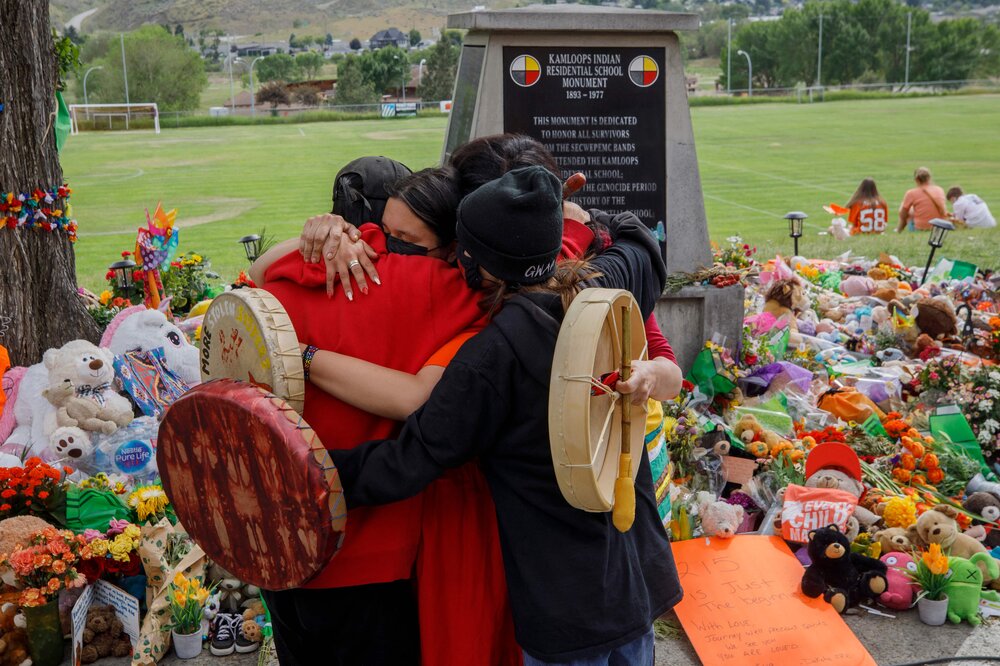True Canada, unearthed...

TEHRAN— As the search for discovering more unmarked graves continue, one thing can be said for sure. Canada, a country that commits “cultural genocide,” cannot decry over human rights.
On July 12, the Penelakut tribe informed that it has discovered 160 unmarked graves in the Southern Gulf Islands in the British Columbia province.
This is a new addition to the recent series of discoveries of unmarked graves and mass burial sites near former residential missionary schools.
According to the reports, the island was a missionary school called Kuper Island Residential School. The school remained operational between 1890 and the 1970s. The Penelakut tribe notified the other indigenous First Nation communities through an online bulletin. “We are inviting you to join us in our work to raise awareness of the Kuper Island Industrial School, and Confirmation of the 160+ undocumented and unmarked graves in our grounds and foreshore,” it said.
“We are at another point in time where we must face trauma because of these acts of genocide. Each time we do, it is possible to heal a little more. Courage is not the absence of fear, courage is acting despite fear,” Penelakut tribe Chief Joan Brown said.
The tribe did not provide additional information about how the graves were discovered or whether any ground-penetrating radar technology was employed. Furthermore, no information was provided on the possibility that the child's remains were in the grave. Joan Brown invited community members to attend the March for the children in Chemainus on August 2 to remember the indigenous children who were forced into the Kuper Island Residential school program. A majority of the deaths were caused due to neglect, tuberculosis, fires, injures from assault, and rapes.
Canada’s Truth and Reconciliation Commission concluded in 2015 that at least 3,200 students died, later revising that figure to 4,100. The No. 1 cause of death was tuberculosis; influenza hit hard, too. Far from home, children were often buried on-site, their graves marked with wooden crosses, most of which deteriorated and disappeared.
As a nation-state, which was built on the skulls of these indigenous people, Canada is doing the least of all to respect them. Canada’s Prime Minister, Justin Trudeau, has not formally apologized yet. Canada wants to hear more than just “thoughts and prayers.”
A huge advocate for human rights issues in all countries, Canada is dealing with human rights crises all over the country. The indigenous people call on the government to end discrimination against them.
The underfunding of child welfare services is just one example of the ways that indigenous children are denied fair and equal access to government services such as education, safe housing, and clean water. The vital services that are necessary to just enjoy fundamental rights and not turn them into provisions of life.
According to an article submitted in the United Nations Chronicle, aboriginals make up about 19 percent of federal prisoners, while their number among the general population is only about 3 percent. Between 1997 and 2000, they were ten times more likely to be accused of homicide than non-aboriginal people. The rate of natives in Canadian prisons climbed 22 percent between 1996 and 2004, while the general prison population dropped 12 percent. In similar societies, discrepancies are equally glaring.
Ed McIsaac, Executive Director of the Office of the Correctional Investigator of Canada, says "We've got a social and economic situation that impact on education, health, and employment. These are variables that bring people into conflict with the justice system.”
“With its roots in social and economic problems that span centuries, legal discrimination against indigenous communities is a daunting problem and requires innovative solutions and international support. But while the problem is anything but simple, many native groups have proven that they're ready for the challenge of finding a lasting solution,” Melissa Gorelick, an associate public information officer with the yearbook unit of the UN Department of Public Information said in his article, titled “Discrimination of Aboriginals on Native Lands in Canada.”
“It still exists in 2020. It's not uncommon to hear people say, ‘go back to your reserve.’” said Kerry Benjoe, a Canadian Broadcasting Corporation contributor on July 1, 2020. She said that the issue of systemic racism is not just limited to the United States and European countries.
On May 28, my daughter asked me a question that has taken me a month to answer.
“How can someone hate someone just because of the color of their skin?" Like many parents, I would have preferred she had not seen a video of a police officer killing George Floyd, but she did. Any other time, I would have brushed her off with a simple answer like, "people are dumb." This time, things were different. "I don't know baby," I said, as I hugged her tightly,” she said in her piece on CBC, posted on July 1, 2020.
Two-thirds of Indigenous people feel that the federal government does not respect their community and identity, according to a poll conducted by Public Square Research and Maru/Blue.
The poll ran between May 31 and June 10, 2019, and included 500 Indigenous people from across the country who responded online.
When asked "Do you feel that the federal government respects your community and identity?" 67 percent of Indigenous respondents said no, and 66 percent said they don't feel like a respected part of Canada.
It seems like Canadian officials must take the time to pay attention to their own country and at the very least, respect the indigenous people whose country they have occupied.
SA/PA
Leave a Comment